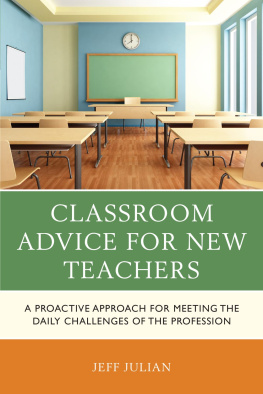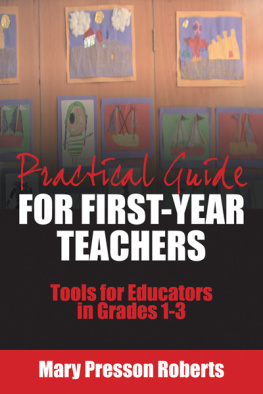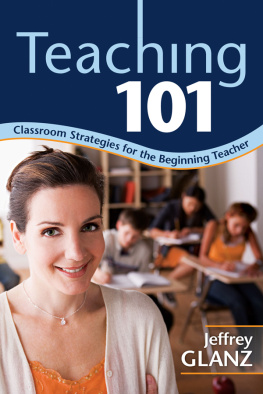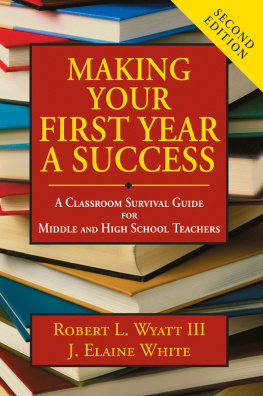Classroom Advice
for New Teachers
Classroom Advice
for New Teachers
A Proactive Approach for Meeting
Daily Challenges in the Profession
Jeff Julian
ROWMAN & LITTLEFIELD
Lanham Boulder New York London
Published by Rowman & Littlefield
An imprint of The Rowman & Littlefield Publishing Group, Inc.
4501 Forbes Boulevard, Suite 200, Lanham, Maryland 20706
www.rowman.com
6 Tinworth Street, London SE11 5AL, United Kingdom
Copyright 2019 by Jeff Julian
All rights reserved . No part of this book may be reproduced in any form or by any electronic or mechanical means, including information storage and retrieval systems, without written permission from the publisher, except by a reviewer who may quote passages in a review.
British Library Cataloguing in Publication Information Available
Library of Congress Cataloging-in-Publication Data Available
ISBN: 978-1-4758-4911-0 (cloth : alk. paper)
ISBN: 978-1-4758-4912-7 (electronic)
 The paper used in this publication meets the minimum requirements of American National Standard for Information SciencesPermanence of Paper for Printed Library Materials, ANSI/NISO Z39.48-1992.
The paper used in this publication meets the minimum requirements of American National Standard for Information SciencesPermanence of Paper for Printed Library Materials, ANSI/NISO Z39.48-1992.
Contents
Ask students what makes a good teacher.
ninth grader
Congratulations! If you are reading this, there is a good chance you are already a teacher, or interested in becoming one, and I consider it the greatest profession in the world. The role teachers play in the lives of students is significant, and we need to remember that it is an honor for us to do so. Your academic preparation in the field of education has been important because it provides a foundation in philosophy and subject-area content. However, this point cannot be overstated: the act of teaching occurs fundamentally in the connection you will have with each individual student. Consequently, your greatest growth as an educator will occur when you spend time in a classroom, sharpening and elevating your judgment as you perform the everyday tasks of the job and engage with students.
The good news is that many teacher-preparation programs at colleges are giving future instructors significantly more on-site experiences in public schools, and that is definitely a positive development. Even so, education students who are about to enter the teaching professionmost of whom have taken multiple courses on educational theoryare hungry for advice on exactly how to connect with students and handle the day-to-day challenges of being a successful educator. I wrote this guide to help new and aspiring teachers fill that need.
The origin of this book, and the perspective I would need in order to write it, began long ago, in the late afternoon of a dark winter day in 1985. I was a college student fulfilling an assignment by leading a discussion in my required history course. In the warmth of our third-story classroom, I experienced the electric excitement of ideas being shared and strongly held points of view being expressed, challenged, and analyzed. As I stood before my college classroom, I was surprised by the thrill I felt by conducting a simple discussion.
My professor, Dr. Joseph Gallagher, noticed my satisfaction from the act of completing his assignment and took a moment of his time, at the conclusion of the class, to encourage me to change my major from engineering to teaching. Under heavy snow and a black sky, as I left the building I saw a clear vision of my future for the first time. The entire trajectory of my life was altered. This moment of personal epiphany remains for me a testament to the influence one teacher can have over the life of a student, and I will always be grateful to him.
As much as I derived satisfaction from leading a discussion in front of college students, who were generally motivated to be there and do the work, it would be a different story altogether to effectively handle the wide spectrum of difficult situations presented to pre-K through 12 teachers every day.
My cooperating teacher during my student-teaching internship, Mr. Joseph Calarco, provided the finest example I have seen of a teacher who galvanizes the attention and engagement of his students. He employed humor, high energy, personal charisma, and inquiry-based questions to forge a strong connection with each individual in the room. Over thirty years later, the memory of his uplifting, positive command of his classroom remains a standard to which I have always aspired but doubt I have ever equaled.
Mr. Calarco also demonstrated wisdom and skill in asking me to evaluate each aspect of my performance, rather than criticizing me directly. This is a technique I believe is both effective and merciful to use with students, because it allows them to maintain their dignity as well as more deeply understand their mistakes. Many of Mr. Calarcos students would tell me that they hated school but loved Mr. Calarco and his class.
How can a new teacher achieve this kind of loyalty on the part of the students? Do not be discouraged if it does not happen right away. Continually evaluate your own performance as objectively as you can, keep the practices that work, and experiment with new techniques. When encountering my own classes for the first time, I discovered that establishing the tone and atmosphere of the room, connecting with my students, proactively avoiding problems, and effectively reacting to the ones that cannot be avoided are skills that can take years to develop.
If you would like an example, picture this: you are standing in front of a group of ninth graders as a relatively new teacher. You introduce an educational activity for the class by saying You know what I havent tried in a while? to which a student replies, A sit-up? What do you say in response to a student comment that is disrespectful and disruptive, but undeniably humorous? Many potential options might come to mind, and your reaction to this type of comment will go a long way toward establishing the tone you create in your classroom. We will revisit this scenario later in these pages.
College and university programs for future educators are outstanding, but it is doubtful that any aspect of your education as a teacher could have prepared you for an encounter of this kind, because the range of potential challenges you are likely to face as a teacher is almost infinite. This type of situation requires a judgment call on your part that will be just one of many you will make on a daily basis as a teacher, and increasing your ability to make those decisions, as well as handle daily tasks effectively, is the reason I compiled this guide.
When you are hired for your first teaching job, you are essentially on your own. Of course, various department members, colleagues, and administrators will be willing to help you, out of empathy and basic human decency. There is nothing wrong with occasionally asking for advice or a question about school policy from a person who has experience in the system and can readily supply an answer. You may even be assigned to a mentor. It is important, though, that you use these encounters sparingly, or you will run the risk of giving the impression that you are having trouble meeting the challenges of your job. Also, remember that your administrators and colleagues are busy struggling to overcome their own challenges.
In the meantime, how do you know what course content you are responsible for covering? When you figure that out, how can you most effectively present and assess your students mastery of that material? How do you arrange your classroom? How do you set up your gradebook? What are the rules of conduct you will establish for your classes? In addition to thinking about how to best establish a connection with your students, have you thought about how you will go about dealing with administrators, colleagues, support staff, parents, school board members, and community members? All of these practical questions are answered in this book.










 The paper used in this publication meets the minimum requirements of American National Standard for Information SciencesPermanence of Paper for Printed Library Materials, ANSI/NISO Z39.48-1992.
The paper used in this publication meets the minimum requirements of American National Standard for Information SciencesPermanence of Paper for Printed Library Materials, ANSI/NISO Z39.48-1992.